“What I say is, a town isn’t a town without a bookstore. It may call itself a town, but unless it’s got a bookstore, it knows it’s not foolin’ a soul.”—Neil Gaiman
Back in the days of bricks and mortar, when “the Internet” wasn’t more than a whisper in the ether, I ran an independent bookstore. May it rest in peace. Now I work in a library, so I’m still surrounded by books, and that’s great. But . . . bookstores. They lure me. Whether they’re large, small, new, used, sleeping on a city corner, or hustling in a neon- and fluorescent-lit strip mall—it hardly matters. How many of you are you with me on that? Judging by the number of crime novels that feature bookstores, either as primary or secondary settings, I’ll bet that’s quite a few. Someday I’d like to make a list of the world’s best bookstores and then organize a months-long fieldtrip circling the globe visit them. That’s a list and a dream for another day, though. For now, here are eight of my favorite fictional crime novel bookstores. The mysteries are topnotch, the bookstores to die for.
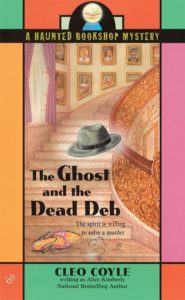
Haunted Bookshop Mysteries, by Alice Kimberly
Enter Buy the Book, in Quindicott, Rhode Island, and you’ll feel as though you’ve stepped into a New Englander’s private library—antique floor and table lamps, restored chestnut-dyed wood plank floors, overstuffed armchairs and Shaker-style rockers. The oak bookshelves are stocked with rare books, New England travel guides, Yankee cookbooks, and plenty of mysteries. The shop, originally named Thornton’s, has occupied the same free-standing stone building since the 1940s. Also occupying the building is the ghost of Jack Shepard, a private eye gunned down in the shop in 1949. The Haunted Bookshop Mysteries provide a clever twist on the charming classic The Ghost and Mrs. Muir by R.A. Dick.

Bernie Rhodenbarr Mysteries, by Lawrence Block
Bernie Rhodenbarr wants to run an old-fashioned bookshop, “the kind where people come in looking for something to read, and collectors come in hunting for treasures, and we all have nice intellectual conversations.” And it’s worked out that way at Barnegat Books, in New York City, for years. But in The Burglar Who Counted the Spoons, book eleven in the series, Bernie is wondering why he bothers putting the bargain table out on the sidewalk. Or why he drags it back inside, for that matter. Anyone stealing a book from it would be doing him a favor. This state of affairs breaks my heart. I’ve visited Barnegat books since Burglars Can’t Be Choosers came out in 1977, and now it’s having troubles because of online selling and e-books. But Bernie has an advantage over other booksellers. He’s a gifted burglar. If anyone can save an independent bookstore, he can.

Death on Demand Mysteries, by Carolyn Hart
Death on Demand has a great location on the boardwalk, facing the marina, on Broward’s Rock Island, South Carolina. It’s billed as the “best mystery bookstore north of Murder on the Beach in Delray Beach, Florida,” and when you step inside, you smell the heady mix of books, binding, and coffee. Shelves line the walls and honey-colored gumwood bookcases range on either side of a broad center aisle. There are comfortable chairs, Whitmani ferns in blue pots, and a stuffed raven perched above the entrance to the children’s section. The coffee is served in mugs featuring the names of famous mysteries. There’s a cat named Agatha and a fireplace. It’s a wonderful place to spend an afternoon or a whole vacation. Annie Darling, the owner, makes frequent reference to real titles and authors throughout the series.
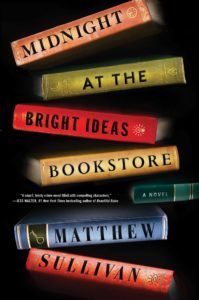
Midnight at the Bright Ideas Bookstore, by Matthew Sullivan
The Bright Ideas Bookstore is open until midnight, which makes it wonderful right there. It’s located on the lower three floors of a former lightbulb factory in Denver, Colorado. They’re cavernous floors mapped out with a warren of tall wooden shelves creating alcoves and sections, each with a chair or a couch or a table or a bench. A wide, tiered staircase climbs through them like a spine. There’s a coffee shop with a corner table, a spirituality section with a church pew, and a story tree in the children’s section. It’s the kind of bookstore that attracts an interesting variety of people and stories.
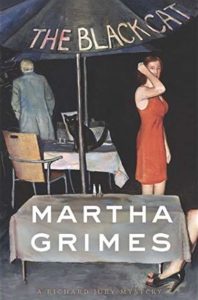
Richard Jury Mysteries, by Martha Grimes
In Theo Wrenn Browne, owner of the Wrenn’s Nest Bookshop, Martha Grimes created an anti-hero bookseller. Few in Long Piddleton, England, have escaped Theo’s waspish tongue. He enjoys a daily dose of misery-making, berates small children, and is a connoisseur of failure. Even the bell over his door tinkles in an irritated way. Maybe Theo and his bell are irritated because they play only a bit part in the books, appearing first in I am the Only Running Footman. We get better acquainted with them in The Five Bells and Bladebone. The shop’s lintels are low, requiring “Mind Your Head” signs, yet the shelves go high enough to warrant a rolling library ladder. No comfy chairs here—a milking stool instead. A rickety stair climbs to the upper level. The place is jam-packed and includes a lending library. I enjoy Theo the way I enjoy some politicians—what awful thing will he say or do next?
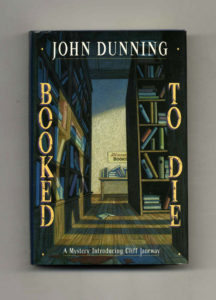
Cliff Janeway Mysteries, by John Dunning
Twice Told Books is another shop in Denver, Colorado, this one in a rambling house built in 1910 with alcoves, side rooms, high ceilings, and lots of atmosphere. Owner Cliff Janeway is a retired policeman and a savvy bookman selling used and rare books. When he quit the force, he rented the house that recent years and tenants hadn’t been kind to. He refurbished the place himself, wanting to feel his book business growing up around him. It’s the kind of bookstore where you pick up quirks of information about first editions, small press runs, and rare, elegant handmade editions of classics. The author is, himself, a bookman. With his wife, Helen, they ran Old Algonquin Books in Denver.

The Ballad of Frankie Silver, by Sharyn McCrumb
This one is almost cheating. The Book Place in Johnson City, Tennessee, is only mentioned once in the book. From that brief mention you get the idea the store has a reputation for tracking down hard to find books, for accurate information, and for a deep collection of local history. It’s the kind of bookshop I’d like to find around the corner from where I live. In fact, once upon a time it was, and McCrumb occasionally shopped there. The shop is long gone, but it lives on in The Ballad of Frankie Silver, thanks to a kind author.
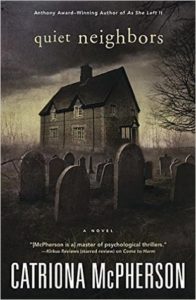
Quiet Neighbors, by Catriona McPherson
Lowland Glen Books, in Scotland’s book town, presents itself to the public as no more than a doorway onto the street. As though it has a secret. As though it might provide refuge. It’s the place McPherson’s protagonist, Jude, runs away to. Jude already knows what she’ll find when she opens the door, “Books. Wavering, tottering piles of books. Brick-stacked towers of books. Woven dykes and leaning spires and threatening landslides of books. Unsorted.” Problematic as those arrangements of books might be, this, for me, is the perfect bookstore. McPherson describes it right up front in Quiet Neighbors, and it drew me inside just as it did Jude.

















